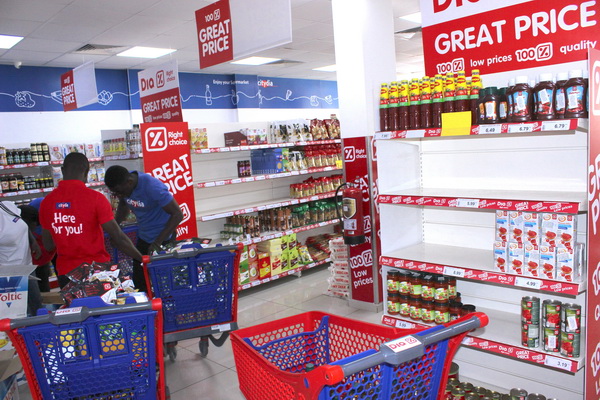The supermarket chain, Citydia, which was shut down temporarily last Tuesday for flouting labelling regulations yesterday began complying with a directive by the Food and Drugs Authority (FDA) to remove products labelled in foreign languages other than English from its shelves.
As of 3 p.m. Wednesday, the supermarket had withdrawn at least 50 products from its shelves and kept them in its storage facilities at its branches.
The products are to be sent to the company’s warehouse at Kpone for relabelling in English.
The groceries included cooking oil, vegetable cream, pasta, assorted noodles, pickled vegetables, dough crepe, tomato paste, cooked kidney beans, cero cola, assorted juice, chocolate, tissue paper, canned tuna, canned squid, biscuits, cosmetics and turkey cold meat.
The withdrawal of the products for relabelling followed a Daily Graphic publication of Monday, April 16, 2018 which drew attention to some supermarkets and mothercare shops in Accra and its outskirts which were selling food and baby products labelled in Chinese and Spanish, in contravention of the law.
Street hawkers
The Daily Graphic, however, found that on some streets in the central business district of Accra, there were still hawkers selling diapers, baby wipes, toys and other baby products whose labels were in Chinese.
-
Foreign-labelled goods flood shops
-
FDA orders Citydia to shut down operations to remove foreign-labelled products
Compliance
When the Daily Graphic visited three of Citydia’s supermarkets at Adabraka, Osu and Dzorwulu, there were visible signs of compliance, as some of the shelves were empty.
Products that were in the past not labelled at all had been labelled. For instance, at the Dzorwulu branch, the products had been labelled to indicate their ingredients and origins.
At the Adabraka branch, employees were seen filling cartons from trolleys under the supervision of an FDA official.
A Citydia-branded truck was parked in front of the supermarket waiting to cart away the removed products.
At the Osu branch, the story was not different. While customers moved in and out of the supermarket, some employees were removing the products that needed relabeling.
The Daily Graphic, however, noticed that the company had banned the taking of photographs in its supermarkets, a decision an official of the company jokingly said was as a result of the Daily Graphic exposé.
Cross check
Mr Bernard Allotey, the Category/Marketing Manager of Citydia, a Spanish company, told the Daily Graphic that the company was following the instructions of the FDA.
“We are going in line with the FDA directive and will ensure that we meet the requirements,” he added.
Asked when the company would remove all the items for labelling, he said the company had used the day to do a background check to ensure that all the products that needed to be off the shelf were not there.
FDA Speaks
Expressing concern about the issue, the FDA, In a statement, said it was taking the necessary regulatory measures against the company for blatantly flouting the provisions of section 136 subsection 2 of the Public Health Act, 2012, Act 851, by offering detained/seized non-compliant products for sale.
The statement signed and issued by the acting Chief Executive of the authority, Mrs Delese A.A. Darko, cautioned importers of food, drugs, cosmetics, medical devices and household chemical substances that the importation, sale and distribution of products not labeled in English contravened Section 4 Subsection 3 of the Ghana Standards Board (Food, Drugs and other Goods) General Labeling Rules, 1992, L.I. 1541.
While stating that it was engaging with Citydia on the issue, it assured the public that it was working assiduously to ensure that its mandate was carried out to the letter.
It entreated the public not to desist from buying and patronising such products and to inform the FDA of any regulated product on market with non-compliant labels by contacting the FDA on 0800151000(toll free on Vodafone and Airtel only), its hotlines 0299802932 or 0299802933, short code, 4015, 0206973065 on WhatsApp and its social media pages.
Background
According to the Daily Graphic publication, since some of the items might contain substances that could trigger allergic reactions, it was important for consumers to have full knowledge of their contents in a language they understood before patronising them.
During a visit to the central business district (CBD) of Accra last Monday, the Daily Graphic found that Amalena Mothercare, for example, had stocked baby cots that had Chinese manuals that might make it difficult to assemble the cots.
In some mothercare shops in the CBD, there were toys, baby wipes and diapers, all with Chinese labels.
What the law says
Ghana Standards Authority (food, drugs and other goods) General Labeling Rules, 1992 (LI 1541) require that the labels of products, including food, shall be printed, impressed, embossed or stamped in the English Language.
Section 8.2 of the Food and Drugs Authority (FDA) Guidelines for the labelling of pre-packaged food also states that “if the language on the original label is not acceptable (not in English) to the consumer for whom it is intended, a supplementary label containing the mandatory information in English may be used instead of relabelling”.
It also states: “In the case of either labelling or a supplementary label, the mandatory information provided shall fully and accurately reflect that in the original label.”

